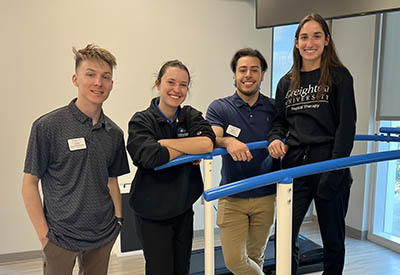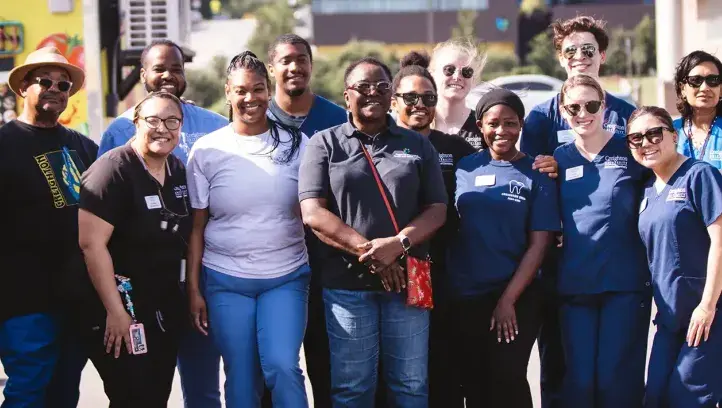
Creighton faculty and students in Phoenix research pickleball’s effect on Parkinson’s

Jamie Nesbit, PT, DPT, NCS, GCS, is an assistant professor of physical therapy in the School of Pharmacy and Health Professions in Phoenix. She continues to flex her clinical skills as a practicing physical therapist, a role that led her to a particularly inspiring patient: Kathryn.
Kathryn experienced debilitating symptoms of Parkinson’s disease, including stiffness, slow movement and poor balance. Kathryn could barely get out of bed due to her symptoms. As a former physical education teacher, Kathryn valued daily movement and exercise. The inability to participate in physical activities was devasting; however, physical therapy with Nesbit monumentally improved Kathryn’s quality of life. When a friend invited her to a pickleball session, she enthusiastically accepted the offer. Kathryn quickly developed a passion for the sport, and the movements involved in pickleball felt strangely familiar.
“The pickleball movements were similar to the exercises I was doing in physical therapy,” says Kathryn.
Kathryn wondered if pickleball could help those with Parkinson’s disease in the way physical therapy improved her symptoms. In addition to the movements and aerobic exercise, the sport promoted social connection. Parkinson’s tends to be an isolating experience, but pickleball could enable engagement with others.
Kathryn proposed a research study on how pickleball affects those with Parkinson’s disease. Nesbit gathered fellow faculty member and professor of physical therapy Tara McIsaac, PT, PhD, and Suzanne O’Neal, PT, DPT, DHSc, and Patrice Ayala, PT, DPT, from Midwestern University to plan the study. In the meantime, Kathryn became a certified pickleball instructor.
The study took place in early 2024, when Kathryn led pickleball sessions with individuals with Parkinson’s disease. Her goal was to teach them basic skills through dynamic warmups, pickleball drills and scrimmages, enabling them to continue playing the sport despite their symptoms. Creighton physical therapy students conducted pre-testing under the guidance of Nesbit and McIsaac and then collected qualitative and quantitative data after the sessions.

"Being part of the research study deepened my understanding of Parkinson’s disease and allowed me to get to know people who suffered from the condition,” says second-year physical therapy student Elizabeth Chico. “I realized that pickleball is a fun way to encourage patients with Parkinson’s to stay physically and socially active."
In February, they will present their data at the Combined Sections Meeting of the American Physical Therapy Association in Houston. Preliminary data indicates that a pickleball program for people with Parkinson’s disease is overall feasible, and a 6-week pickleball intervention may improve upper limb function. Qualitatively, the preliminary data has revealed themes such as pickleball for Parkinson’s disease creates positive social-emotional connections, is sustainable for people with Parkinson’s disease, positively addresses symptoms of Parkinson’s disease and allows people with Parkinson's disease to feel as if they transcend the disease while playing.
Aside from early research findings, the pickleball sessions made a positive impact on the players.
“Pickleball is perfect for people with Parkinson’s disease,” says Kathryn. “In just one game, participants partake in multidirectional stepping, weight shifting and multitasking, all activities that have been proven to slow down the progression of the disease. Most importantly, pickleball is a very engaging opportunity for players to have a lot of fun!”




